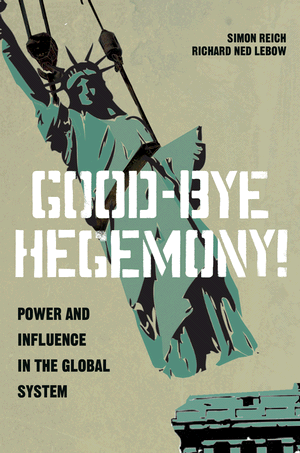
Published in the Cambridge Review of International Affairs
DOI:10.1080/09557571.2015.1004945
http://www.tandfonline.com/doi/abs/10.1080/09557571.2015.1004945?journalCode=ccam20#.VOMsYHbDHLU
————–
Goodbye Hegemony!: Power and Influence in the Global System. Simon Reich and Richard Ned Lebow. Princeton University Press, 2014. 197 pages, R$ 33,47 (www.amazon.br)
The debate about what comes after US hegemony is misguided, Simon Reich and Ned Lebow argue in their new book. After all, they say, hegemony ended decades ago, and today it is nothing more than a “fiction propagated to support a large defense establishment, justify American claims to world leadership, and buttress the self-esteem of voters.” Rejecting claims of US leadership after the end of the Cold War, the authors argue that while the United States has indeed lots of hard power, it is no longer capable of converting it into actual influence over others. Policy makers in Washington, DC are no longer effectively managing the economic system, nor are they able to maintain and enforce global rules – a capacity Reich and Lebow call “sponsorship”.
Liberals and realists will find some of these arguments hard to pin down – for example, the authors repeatedly point out that hard power matters little without “the capacity to listen.” Yet Reich and Lebow are right in their argument that analysts too often equate power and influence without at least asking how they are connected. For example, will China’s economic leadership automatically turn it into the world’s most influential actor, or does the fact that it lacks political freedom and transparency limit its capacity to have it its way?
This makes Goodbye Hegemony! is an excellent case study of constructivist theory applied to a big contemporary question. Indeed, after a somewhat slow start, Reich and Lebow offer a sophisticated and engaging critique of both realist and liberal theory, pointing out that both tend to have a romanticized vision of the United States’ role in international affairs. The authors are perhaps most skeptical of Ikenberry’s liberal view of the United States as a “liberal hegemon” who was voluntarily handed the reigns of power by many countries around the world.
As they argue,
This remarkable claim ignores the unsanctioned stationing of US troops in the defeated Axis powers, the threats and coercion against communists in France and Italy, and efforts, in Europe and elsewhere, to impose US political and economic preferences.
Equally remarkable is the authors’ argument that
the United States has violated the responsibilities and roles assigned to a hegemon… constituting as much a threat to global order and stability as it is a possible pillar of its preservation.
Many policy makers and academics in developing countries are likely to agree. Yet as Reich and Lebow correctly point out, their view is a complete outlier in the US-American debate which “ignores or minimizes the importance of these views.” This not only impoverishes the academic debate in the United States, but also provides policy makers with a very limited toolbox of how to effectively engage the rest of the world.
Their policy recommendations are clear: The United States’ foreign policy objective should no longer seek to pursue its position as the global hegemon, a position it has lost long ago. Excessive military spending merely encourages interventions: For those who have a hammer, every problem looks like a nail. Using the example of the war against Iraq in 2003, the authors argue that reducing its military power could actually increase US global influence. In an interesting thought experiment the authors will certainly use in all their speeches to promote their book, they ask the reader to imagine what the United States would look like today had it reduced military spending dramatically after the end of the Cold War, and invested billions of dollars in education, research and infrastructure instead. They suggest that the United States would be far more influential than it is today. Similarly, they point out that the US provides $ 3 billion in military aid to Israel and $ 1.5 billion to Egypt per year and question what exactly the United States gets in return.
Looking beyond the United States’ international strategy, Reich and Lebow argue that the world is shifting towards a division of functions, and that a hegemon is unnecessary for international stability. They go so far as to say that, in an increasingly multipowered world, the idea of a hegemon is “inappropriate.”
Mainstream thinkers in the United States will ask what China has done over the past years to provide global public goods, arguing that a US military retreat from Asia would cause several of China’s neighbors to acquire nuclear weapons. Who will secure global sea lanes? In the same way, they will point out that without US military power, the world would have been unable to stop genocide in Kosovo. Who, if not the United States, they may ask, would address the rise of the Islamic State of Iraq and Syria (ISIS)?
Still, Goodbye Hegemony! is a highly entertaining and thought-provoking piece of analysis. Even those who disagree with the authors’ point of view will recognize that it enriches a surprisingly one-dimensional debate about the future of global order and the United States’ role in it. The big question is to what extent Reich and Lebow will be able to influence policy debates in Washington DC, which continue to revolve around the question of how to maintain US hegemony.
Read also:
Book review: “Maxwell’s Demon and the Golden Apple” by Randall L. Schweller
Book review: “Theory of Unipolar Politics” by Nuno P. Monteiro








